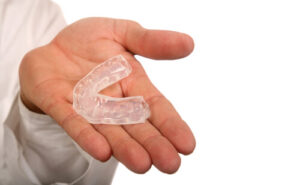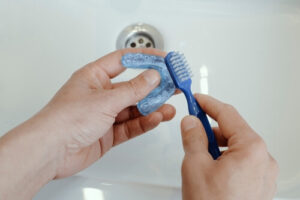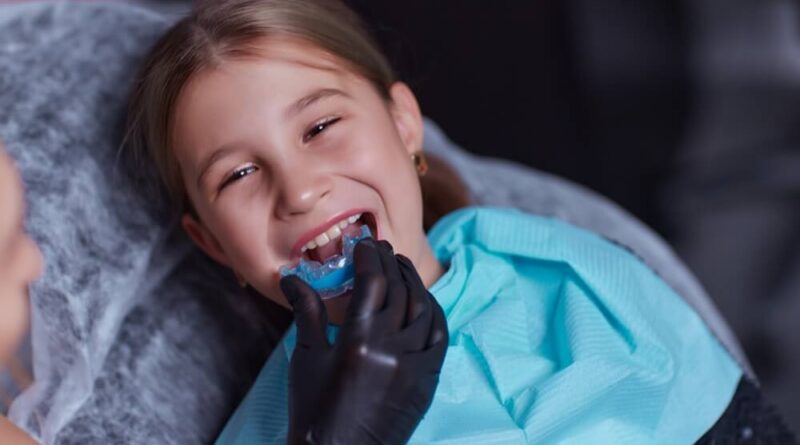Unlock Serene Slumbers: The Magic of Mouth Guard for Teeth Grinding
An unexpected solution has been making waves in the world of dentistry and sleep science – the mouth guard for teeth grinding. If you find yourself waking up with aching jaws, tooth pain, or even headaches, you might be unconsciously grinding your teeth during sleep, a condition known as bruxism. This common but often overlooked issue can lead to serious dental damage if left unchecked. Enter the mouth guard, a simple yet incredibly effective tool designed to protect your precious pearly whites from the pressure and friction of teeth grinding. Read on to discover how this small device could make a huge difference in your nightly rest and long-term dental health.
Bruxism or Grinding teeth
Bruxism refers to the involuntary or habitual grinding, clenching, or gnashing teeth. It is a common condition that can occur during the day or night, although sleep bruxism is more prevalent. Many people may be unaware that they are grinding their teeth since it often happens during sleep or during times of stress and anxiety. Bruxism can vary in intensity, ranging from occasional and mild grinding to chronic and severe clenching.
The common problems of teeth grinding (bruxism)
- Dental Damage: Teeth grinding can result in enamel erosion, tooth wear, and even cracked or chipped teeth due to the excessive force applied during grinding.
- Jaw Pain and Discomfort: Bruxism can cause jaw pain, soreness, and stiffness due to the prolonged clenching and grinding of the teeth. This can lead to temporomandibular joint (TMJ) disorders and difficulty properly opening or closing the mouth.
- Headaches and Facial Pain: Teeth grinding can contribute to frequent headaches, migraines, and facial pain. The pressure and tension created by grinding can strain the facial muscles and nerves, leading to discomfort.
- Sleep Disturbances: Bruxism often occurs during sleep, causing disruptions in sleep patterns for both the teeth grinder and their sleep partner. The grinding noises and movements can lead to restless sleep, frequent awakenings, and daytime fatigue.
- Dental Sensitivity: Enamel erosion caused by teeth grinding can increase dental sensitivity. Losing enamel exposes the sensitive dentin layer, making the teeth more susceptible to pain and discomfort when exposed to hot, cold, or sweet foods and beverages.
- TMJ Disorders: Persistent teeth grinding can contribute to developing temporomandibular joint (TMJ) disorders, characterized by pain, clicking or popping sounds, and limited jaw movement. These disorders can significantly impact jaw functionality and overall quality of life.
- Tooth Fractures: In severe cases of bruxism, the constant grinding and clenching can lead to tooth fractures. In extreme cases, this can necessitate extensive dental treatment, including fillings, crowns, or even tooth extraction.
- Gum Recession: The excessive pressure exerted on the teeth and gums during teeth grinding can contribute to gum recession. Receding gums expose the tooth roots, leading to increased sensitivity, root decay, and an increased risk of tooth loss.
Significance of addressing teeth grinding to avoid dental damage
Addressing teeth grinding is of significant importance to avoid dental damage for several reasons:
- Preservation of Tooth Structure: Teeth grinding exerts excessive force and friction on the teeth, leading to enamel erosion, tooth wear, and even tooth fractures. By addressing teeth grinding, individuals can prevent tooth structure loss and maintain their teeth’ integrity.
- Prevention of Dental Sensitivity: Enamel erosion caused by teeth grinding exposes the underlying dentin layer, which contains microscopic tubules connected to nerve endings. This can increase dental sensitivity, causing discomfort and pain when consuming hot, cold, or sweet foods and beverages. Managing teeth grinding can help reduce dental sensitivity and enhance overall comfort.
 Protection against TMJ Disorders: Chronic teeth grinding can contribute to the development of temporomandibular joint (TMJ) disorders. Excessive pressure and strain on the jaw joint can lead to jaw pain, clicking or popping sounds, limited jaw movement, and even lockjaw. By addressing teeth grinding, individuals can reduce the risk of TMJ disorders and maintain proper jaw function.
Protection against TMJ Disorders: Chronic teeth grinding can contribute to the development of temporomandibular joint (TMJ) disorders. Excessive pressure and strain on the jaw joint can lead to jaw pain, clicking or popping sounds, limited jaw movement, and even lockjaw. By addressing teeth grinding, individuals can reduce the risk of TMJ disorders and maintain proper jaw function.- Avoidance of Dental Restorations and Treatments: Severe teeth grinding may result in extensive dental damage, requiring various restorative treatments such as fillings, crowns, or tooth extractions. These treatments can be costly, time-consuming, and require additional dental procedures. By addressing teeth grinding early on, individuals can potentially avoid the need for extensive dental restorations and associated complications.
- Preservation of Oral Health: Teeth grinding can have a negative impact on overall oral health. It can contribute to gum recession, increase the risk of tooth decay and gum disease, and even lead to tooth loss. By managing teeth grinding, individuals can preserve their oral health, maintain a healthy dentition, and reduce the need for complex dental interventions.
Overall, addressing teeth grinding is crucial to prevent dental damage, preserve tooth structure, alleviate discomfort, and maintain optimal oral health. It is advisable to consult a dental professional for an accurate diagnosis and to develop an appropriate treatment plan tailored to individual needs.
Causes and potential consequences of teeth grinding
Causes of Teeth Grinding (Bruxism):
- Stress and Anxiety: Psychological factors, such as stress, anxiety, or tension, are commonly associated with teeth grinding. The subconscious grinding of teeth during sleep or conscious clenching during periods of stress can occur as a response to emotional or psychological pressure.
- Abnormal Bite Alignment (Malocclusion): Teeth grinding can be caused by misalignment of the upper and lower teeth, known as malocclusion. When the teeth do not fit together properly, it can lead to excessive grinding or clenching in an attempt to find a more comfortable position.
- Sleep Disorders: Bruxism is often prevalent in individuals with sleep disorders such as sleep apnea or snoring. The mechanisms behind the connection between sleep disorders and teeth grinding are not fully understood, but it is believed that certain sleep-related factors contribute to bruxism.
- Lifestyle Factors: Certain lifestyle habits like excessive alcohol consumption, tobacco use, or the use of stimulants like caffeine or recreational drugs can increase the risk of teeth grinding.
- Medications and Substances: Bruxism can be a side effect of certain medications, such as selective serotonin reuptake inhibitors (SSRIs), to treat depression and anxiety. Additionally, substances like amphetamines or recreational drugs may also trigger teeth grinding.
Potential Consequences of Teeth Grinding:
- Dental Damage: The excessive forces generated during teeth grinding can lead to enamel erosion, tooth wear, and fractures. This can result in tooth sensitivity, increased risk of cavities, and the need for dental restorations like fillings or crowns.
- Jaw Pain and TMJ Disorders: The constant clenching and grinding of teeth can strain the jaw muscles, causing jaw pain, soreness, and stiffness. In severe cases, it may contribute to the development of temporomandibular joint (TMJ) disorders, affecting the jaw joint’s functionality and causing additional symptoms like clicking or popping sounds and limited jaw movement.
- Headaches and Facial Pain: Bruxism can lead to chronic headaches, migraines, and facial pain due to the muscle tension and strain associated with teeth grinding.
- Sleep Disturbances: Teeth grinding during sleep can disrupt sleep patterns, causing disturbed sleep for both the grinder and their sleep partner. This can result in daytime fatigue, reduced quality of sleep, and other sleep-related issues.
- Gum Recession: The excessive pressure exerted on the teeth and gums during grinding can contribute to gum recession, exposing the tooth roots and increasing the risk of tooth sensitivity, root decay, and tooth loss.
- Temporomandibular Joint (TMJ) Disorders: Persistent teeth grinding can develop TMJ disorders characterized by jaw pain, limited jaw movement, and discomfort in the jaw joint.
It is important to address teeth grinding to mitigate these potential consequences and prevent further oral health complications. Seeking professional dental advice is recommended for an accurate diagnosis and appropriate management of bruxism.
The connection between teeth grinding and sleep disturbances
Teeth grinding can have a significant impact on sleep patterns and contribute to various sleep disturbances. The connection between teeth grinding and sleep disturbances is often bidirectional, with each condition exacerbating the other. Here are some ways in which teeth grinding can affect sleep:
- Disrupted Sleep Architecture: The grinding and clenching of teeth during sleep can cause micro-arousals, brief awakenings, or even full awakenings. These disruptions can fragment sleep and lead to a poorer quality of sleep overall.
- Nocturnal Awakenings: Teeth grinding can generate loud grinding noises, which can awaken not only the person grinding their teeth but also their sleep partner. This can result in multiple nocturnal awakenings and disturb the sleep of both individuals.
- Sleep Fragmentation: The frequent episodes of teeth grinding can fragment sleep, leading to a disrupted sleep architecture. This can prevent the individual from experiencing restful, deep sleep stages, resulting in feelings of daytime fatigue, sleepiness, and reduced cognitive performance.
- Sleep-Related Movement Disorders: Teeth grinding is classified as a sleep-related movement disorder. It often coexists with other movement disorders, such as restless leg syndrome (RLS) or periodic limb movement disorder (PLMD). The combination of these conditions can significantly disrupt sleep, making achieving a restorative sleep state difficult.
 Sleep Bruxism and Sleep Apnea: There is a known association between sleep bruxism and sleep apnea, a sleep disorder characterized by pauses in breathing during sleep. Research suggests that the two conditions may share risk factors and underlying mechanisms. Sleep apnea can increase the likelihood of teeth grinding and vice versa, leading to a mutually exacerbating cycle.
Sleep Bruxism and Sleep Apnea: There is a known association between sleep bruxism and sleep apnea, a sleep disorder characterized by pauses in breathing during sleep. Research suggests that the two conditions may share risk factors and underlying mechanisms. Sleep apnea can increase the likelihood of teeth grinding and vice versa, leading to a mutually exacerbating cycle.- Daytime Sleepiness and Fatigue: The sleep disruptions caused by teeth grinding can result in excessive daytime sleepiness and fatigue. Individuals may find it challenging to stay awake and alert during the day, affecting their overall quality of life, productivity, and daytime functioning.
- Psychological Impact: The chronic sleep disturbances associated with teeth grinding can also contribute to psychological distress, such as increased stress, anxiety, and mood disturbances. This can further perpetuate the cycle of teeth grinding and sleep disturbances.
It is essential to address teeth grinding to minimize its impact on sleep. Seeking professional help from a dentist or sleep specialist can provide effective strategies, such as dental devices, stress management techniques, and lifestyle modifications, to alleviate teeth grinding and improve sleep quality.
How mouth guards work to protect teeth during grinding episodes
Mouth guards are dental devices specifically designed to protect the teeth during grinding episodes. They create a barrier between the upper and lower teeth, absorbing and distributing the forces generated during grinding. Here’s how mouthguards function to safeguard teeth:
- Cushioning Effect: Mouth guards are typically made of a soft, flexible material that acts as a cushioning barrier between the upper and lower teeth. When the individual clenches or grinds their teeth, the mouth guard absorbs and disperses the excessive forces, minimizing the impact on the teeth.
- Redistribution of Forces: By evenly distributing the forces generated during teeth grinding, mouth guards help prevent concentrated pressure on specific teeth. This redistribution helps reduce the risk of tooth wear, fractures, and other dental damage that can occur due to excessive force on isolated teeth.
- Protection against Enamel Erosion: Teeth grinding can lead to enamel erosion, the gradual wearing away of the tooth’s outer protective layer. Mouth guards provide a protective barrier that helps shield the enamel from direct contact and friction, reducing the rate of enamel erosion.
- Absorption of Vibrations and Impact: The material used in mouth guards absorbs the vibrations and impact caused by teeth grinding, preventing them from directly transmitting to the teeth and jaw. This helps minimize the strain on the jaw joints and surrounding muscles, reducing the risk of temporomandibular joint (TMJ) disorders and associated pain.
- Prevention of Tooth-on-Tooth Contact: Mouthguards create a physical separation between the upper and lower teeth, preventing the grinding surfaces from coming into direct contact. This separation helps reduce the abrasive wear that can occur when the teeth rub against each other during grinding.
- Protection during Sleep: Many individuals experience teeth grinding primarily during sleep. Mouth guards designed for nighttime use provide continuous protection throughout the night, ensuring that teeth remain shielded during grinding episodes while the individual is unaware.
It’s important to note that mouthguards should be custom-fitted by a dental professional for optimal effectiveness and comfort. Custom-made mouthguards offer a more precise fit and better protection than over-the-counter options. Regular cleaning and maintaining the mouth guard are also crucial to ensure its longevity and hygiene.
Benefits of Mouth Guards
Mouthguards can play a significant role in potentially reducing jaw pain, headaches, and tooth sensitivity associated with teeth grinding. Here’s how mouthguards provide relief for these symptoms:
- Jaw Pain Reduction: Mouth guards act as a cushioning barrier between the upper and lower teeth, absorbing and distributing the forces generated during teeth grinding. By minimizing the impact on the jaw joint and muscles, mouth guards help alleviate jaw pain and reduce discomfort caused by the excessive strain on the temporomandibular joint (TMJ).
- Headache Relief: Teeth grinding can contribute to headaches and migraines due to the tension and muscle strain in the jaw, face, and head. Mouth guards provide a cushioning effect that helps relax the jaw muscles and reduces the intensity of grinding forces. This relaxation can alleviate muscle tension and alleviate associated headaches.
- Tooth Sensitivity Reduction: Enamel erosion caused by teeth grinding can lead to tooth sensitivity, making the teeth more susceptible to pain or discomfort when exposed to hot, cold, or sweet foods and beverages. Mouth guards provide a protective barrier, preventing direct tooth-on-tooth contact during grinding. This separation helps minimize enamel erosion, reducing tooth sensitivity and enhancing comfort.
- Prevention of Dental Damage: By creating a physical barrier between the upper and lower teeth, mouth guards help protect against tooth wear, fractures, and other dental damage caused by grinding. By minimizing the direct impact on individual teeth, mouth guards help maintain tooth structure, reducing the risk of further tooth sensitivity and preserving oral health.
- Sleep Improvement: Mouth guards designed for nighttime use provide continuous protection during sleep. By reducing the disturbances caused by teeth grinding, mouth guards can help improve sleep quality. Better sleep quality leads to reduced fatigue, increased daytime functioning, and an overall improvement in well-being.
Different types of mouth guards available
There are several types of mouthguards available, each offering varying levels of customization, comfort, and protection. Here are the different types of mouth guards commonly used:
Custom-Fitted Mouth Guards: These are professionally made and individually tailored to fit the specific contours of a person’s teeth. A dental professional takes impressions of the teeth, which are then used to fabricate a custom mouth guard. Custom-fitted mouthguards offer the best fit, comfort, and protection, as they are designed specifically for the individual’s mouth. They are generally more expensive than other types of mouthguards but provide optimal results.
Pros:
- They have excellent fit and comfort, as they are made specifically for an individual’s teeth.
- Maximum protection against teeth grinding and related dental damage.
- It can be customized for specific jaw or bite issues.
- Long-lasting and durable with proper care.
Cons:
- More expensive compared to other types of mouthguards.
- Requires a visit to a dental professional for impressions and fabrication.
- Takes time to be fabricated and delivered.
- It may not be easily adjustable if minor changes in fit are needed.
Boil-and-Bite Mouth Guards: Boil-and-bite mouthguards are available over the counter and offer a degree of customization. They are made from a thermoplastic material that softens when boiled and then molded to fit the teeth. The user bites down on the softened material to create an impression. Boil-and-bite mouth guards provide a better fit than stock mouth guards but are not as precise as custom-fitted options.
Pros:
- Relatively affordable compared to custom-fitted mouthguards.
- Offers a better fit and customization compared to stock mouthguards.
- It can be molded to the individual’s teeth for improved comfort and protection.
- Available over-the-counter without the need for dental visits.
Cons:
- Fit and comfort may vary based on the individual’s ability to mold the mouth guard correctly.
- Less precise fit compared to custom-fitted mouthguards.
- It may not provide the same level of protection as custom-fitted options.
- Requires careful attention to boiling and moulding instructions for optimal results.
Stock Mouth Guards: Stock mouth guards are pre-formed and come in standard sizes. They are readily available at sporting goods stores or pharmacies and are the most affordable option. Stock mouthguards offer minimal customization and may not fit well, making them less comfortable and providing limited protection. They can be bulky and may interfere with speech or breathing.
Pros:
- Most affordable option.
- Easily accessible at sporting goods stores or pharmacies.
- No molding or customization is required.
- Immediate availability for immediate use.
Cons:
- Least comfortable and may feel bulky.
- Limited fit options, which can affect protection and comfort.
- It may interfere with speech, breathing, or swallowing.
- Provides the least amount of protection compared to custom-fitted or boil-and-bite mouth guards.
Dual Laminate Mouth Guards: Dual laminate dental guards have a soft inner layer for comfort and cushioning and a harder outer layer for durability and protection. They provide a combination of flexibility and strength, balancing comfort and functionality. Dual laminate mouth guards are typically custom-made by a dental professional.
Pros:
- Combines the benefits of a soft inner layer for comfort and a hard outer layer for protection.
- Offers a good balance between flexibility and durability.
- Custom-made to provide an optimal fit.
- Suitable for individuals with specific jaw or bite issues.
Cons:
- More expensive than stock or boil-and-bite mouth guards.
- Requires a visit to a dental professional for fabrication.
- It may take time to be fabricated and delivered.
- Requires proper care and maintenance for longevity.
Night Guards: Night guards, also known as nocturnal bite plates or splints, are specifically designed to be worn during sleep to address teeth grinding or clenching. They are typically made of acrylic or similar materials and provide a protective barrier between the lower and upper teeth. Night guards can be custom-fitted or available in boil-and-bite options.
Pros:
- Protects teeth from grinding during sleep
- Alleviates jaw pain and discomfort
- Prevents dental damage and wear
- Improves sleep quality
Cons:
- Initial adjustment period
- Possible changes in speech or saliva production
- Requires regular maintenance and cleaning
- Cost varies; custom options can be more expensive.
Tips for selecting the best mouthguard based on individual needs and preferences
When selecting a night guard, consider the following tips to help you choose the best option for your needs:
 Consult with a Dental Professional: Seek advice from a dental professional who can assess your specific situation and provide recommendations based on your individual needs, the severity of teeth grinding, and any existing dental conditions.
Consult with a Dental Professional: Seek advice from a dental professional who can assess your specific situation and provide recommendations based on your individual needs, the severity of teeth grinding, and any existing dental conditions.- Custom-Fitted is Ideal: Custom-fitted mouth guards offer the best fit, comfort, and protection. They are designed specifically for your mouth, ensuring a precise fit and optimal effectiveness. Consider investing in a custom-fitted mouthguard for the highest level of customization and protection.
- Consider Boil-and-Bite Options: If a custom-fitted mouth guard is not feasible, look for boil-and-bite mouth guards. These can be molded to your teeth after being softened in hot water, offering a better fit than stock mouth guards. Follow the instructions carefully for proper molding.
- Determine the Level of Protection Needed: Assess the severity of your teeth grinding and the associated risks. If you grind heavily or have a history of dental damage, prioritize night guards that provide superior protection and cushioning.
- Comfort and Retention: Choose a mouth guard that is comfortable to wear, doesn’t interfere with speech or breathing, and stays securely in place during sleep or activity. Proper fit and retention are important for the dental guard to be effective.
- Quality and Durability: Look for mouth guards made of durable materials that can withstand regular use and grinding forces. Ensure they are free from any potentially harmful substances.
- Ease of Cleaning and Maintenance: Opt for mouth guards that are easy to clean and maintain. Proper hygiene is essential to prevent bacterial growth and maintain the longevity of the mouth guard.
- Consider the Cost: Balance your budget with the level of protection and comfort you require. Custom-fitted mouth guards are more expensive but offer superior fit and effectiveness. Explore different options and consult your dental professional to find the best value for your needs.
Remember, proper diagnosis and guidance from a dental professional are crucial in selecting the most appropriate mouth guard for your situation. They can provide personalized recommendations based on your oral health and help you make an informed decision.
References:
https://my.clevelandclinic.org/health/articles/10910-mouthguards
https://www.sleepfoundation.org/best-mouthguard-for-teeth-grinding
https://nymag.com/strategist/article/best-mouth-guards-and-night-guards-for-teeth-grinding.html
https://www.medicalnewstoday.com/articles/mouth-guard-for-grinding-teeth
https://www.verywellhealth.com/best-night-guards-grinding-teeth-7106286
https://www.forbes.com/health/dental/best-night-guards-for-teeth-grinding/

